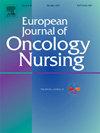Stigma, colorectal cancer knowledge and self-efficacy among colorectal cancer survivors: A cross-sectional study based on random forest analysis
IF 2.7
3区 医学
Q1 NURSING
引用次数: 0
Abstract
Purpose
To assess the stigma levels among colorectal cancer (CRC) survivors, identify determinants, examine correlations with CRC knowledge and self-efficacy, and quantify the relative influence of various contributing factors.
Methods
In total, 301 CRC survivors were enrolled from a tertiary oncology center in southern China. The participants completed the Social Impact Scale (SIS), Bowel Cancer Awareness Measure (Bowel CAM), General Self-Efficacy Scale (GSES), and a demographic and disease-related questionnaire. The analytical framework included multiple linear regression to identify the factors influencing stigma, LASSO regression for variable refinement, and random forest modeling to construct hierarchies of factor importance.
Results
Participants demonstrated moderate levels across all measures: stigma (54.63 ± 8.37), CRC knowledge (8.25 ± 4.74), and self-efficacy (26.81 ± 5.95). Multiple linear regression identified type of medical insurance, support from peers, unwillingness to accept colonoscopy, CRC knowledge, and self-efficacy as significant factors influencing stigma. Random forest analysis ranked factor importance by Gini index: self-efficacy (4366.41), support from peers (1618.03), CRC knowledge (1029.04), type of medical insurance (886.66), and unwillingness to accept colonoscopy (750.16).
Conclusions
Healthcare providers should pay more attention to stigma among CRC patients. Effective stigma reduction necessitates culturally-sensitive psychosocial interventions, including enhancing patients’ confidence in managing their disease, strengthening professional-driven online popularization of science campaigns, and facilitating social support networks.
污名、结直肠癌知识和结直肠癌幸存者的自我效能感:一项基于随机森林分析的横断面研究
目的评估结直肠癌(CRC)幸存者的耻辱感水平,确定影响因素,检查与CRC知识和自我效能的相关性,并量化各种影响因素的相对影响。方法共纳入来自中国南方某三级肿瘤中心的301例结直肠癌幸存者。参与者完成了社会影响量表(SIS)、肠癌意识量表(肠CAM)、一般自我效能量表(GSES)以及人口统计和疾病相关问卷。分析框架包括多元线性回归识别影响柱头的因素,LASSO回归用于变量细化,随机森林模型用于构建因素重要性层次。结果参与者在所有测量中均表现出中等水平:耻感(54.63±8.37),CRC知识(8.25±4.74)和自我效能(26.81±5.95)。多元线性回归发现,医疗保险类型、同伴支持、不愿接受结肠镜检查、结直肠癌知识和自我效能感是影响耻感的显著因素。随机森林分析对各因素的基尼系数排序为:自我效能感(4366.41)、同伴支持(1618.03)、CRC知识(1029.04)、医疗保险类型(886.66)、不愿接受结肠镜检查(750.16)。结论卫生保健工作者应重视CRC患者的病耻感问题。有效减少耻辱感需要具有文化敏感性的社会心理干预措施,包括增强患者对疾病管理的信心,加强专业驱动的在线科学普及运动,以及促进社会支持网络。
本文章由计算机程序翻译,如有差异,请以英文原文为准。
求助全文
约1分钟内获得全文
求助全文
来源期刊
CiteScore
4.40
自引率
3.60%
发文量
109
审稿时长
57 days
期刊介绍:
The European Journal of Oncology Nursing is an international journal which publishes research of direct relevance to patient care, nurse education, management and policy development. EJON is proud to be the official journal of the European Oncology Nursing Society.
The journal publishes the following types of papers:
• Original research articles
• Review articles

 求助内容:
求助内容: 应助结果提醒方式:
应助结果提醒方式:


